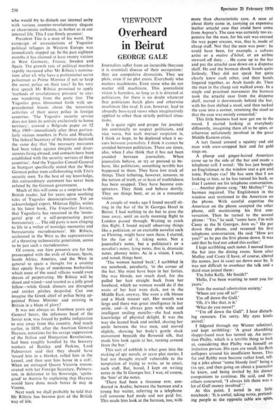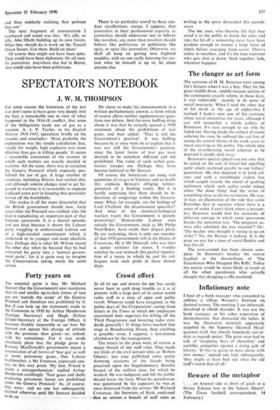VIEWPOINT
Overheard in Beirut
GEORGE GALE
Journalists suffer from an incurable (because it is essential) disease of their occupation : they are compulsive dramatists. They see plots, even if no plot exists. Everybody who matters machinates. Even some who do not matter still machinate. This journalistic vision is harmless, so long as it is directed at politicians, for there is no doubt whatever that politicians hatch plots and otherwise machinate like mad. It can, however, lead to absurdly boss-eyed views when imaginatively applied to other than strictly political situa- tions.
It is quite right and proper for journal- ists continually to suspect politicians, and vice versa, but such mutual suspicion is, I think or hope, to be deplored when it oc- curs between journalists. I think it cannot be avoided between politicians. There are times, 'alas, when I also think that it has not been avoided between journalists. When journalists behave, or try or pretend to be- have, like politicians, something terrible has happened to them. They have lost track of things. Their tethering, however, tenuous, to the notion of truth, or at least of truthfulness has been snapped. They have become con- spirators. They think and behave dottily. They see things bent, or as in a romantic vision.
A couple of weeks ago I found myself sit- ting in the bar of the St Georges Hotel in Beirut. I had nothing to do but to pass the time away, until an early morning flight to London passed through. Waiting to catch this flight, I found myself observing things like a politician, or an excitable novelist such as Fleming, might have seen them. I started, for the fun of it, taking notes. Not a journalist's notes, but a politician's or a novelist's notes; lying notes, that is, dramatic notes, phoney notes. As in a vision, I saw, and noted, things bent.
`The woman leaned back', I scribbled in my notebook, peculiarly, 'in the corner of the bar. She must have been in her forties. She was blonde, not much dyed, for she pulled her hair straight back from her forehead, which no woman would do if the roots of her hair were dark, not in the Middle East, anyway. She wore a silk blouse and a black trouser suit. Her mouth was large and there was great intelligence in her smile, and—it always goes with wide and intelligent smiling mouths—she had much knowledge of physical delight. It was the way she leaned back and smiled, sharing her smile between the two men, and moved slightly, showing her body's gentle slack movement beneath the flowered silk, that made him look again at her, turning around from the bar.'
This sort of rubbish is what goes into the making of spy novels, or scare plot stories. I had not thought myself vulnerable to the temptation of trying to write, or to enact, such stuff. But, bored, I kept on writing notes in the St Georges bar. I was, of course, the 'him' of the notes.
`There had been a tiresome row, con- ducted in Arabic, between the barman and a young bar waiter, referring to a telephone call someone had made and not paid for. This made him look at the barman, too, with more than characteristic care. A man of about thirty came in, carrying an expensive leather attaché case that could have come from Asprey's. The case was certainly too ex- pensive for the man, for his suit was creased the way paper creases, was, that is, made of cheap stuff. Not that the man was poor: he could have been, for example, a cabaret artist or a maitre d'hôtel, or an airline steward off duty. . . He came up to the bar and put the attaché case down on a dispense shelf. He and the barman shook hands quite listlessly. They did not speak but quite clearly knew each other, and their hands lingered together, as Arab hands do. Then the man in the cheap suit walked away. In a single and practised movement the barman took the attaché case from the dispense shelf, moved it downwards behind the bar, with his foot shifted a stool, and then tucked the case into a corner, returning the stool so that the case was mainly concealed.'
This little business had now got me in the mood. I started looking at everybody differently, imagining them all to be spies, or otherwise nefariously involved in the great Middle Eastern crisis.
A tart fussed around a squinty and old man with crew-cropped hair and fat gold rings on.
A plump and ginger-haired American came up to the side of the bar and made a telephone call. I noted : 'He has just bought an Englishman in the window seat a gin and tonic. Perhaps cm.? He has seen that I am looking at him, so he has turned his back, so that I cannot see his telephone conversation.
. Another phone rang. "Mr Molloy?" the barman inquired. The Englishman in the window seat motioned to the American on the phone. With careful expertise the American on the phone accepted the other phone, still maintaining his first con- versation. Then he turned to the second phone: "Yes," he said, "come here. I'm with Casey at the St Georges. Join us." He put down that phone, and resumed his first telephone conversation. He said "How are you?" as he put the first phone down. It was odd that he had not asked this earlier.'
I kept scribbling such notes. I moved from the bar into the dining room. Soon after Molloy and Casey (I have, of course, altered the names, just in case) sat down near by. It was not difficult to overhear the talk and a third man joined them: `I'm John Kelly. Mr Smith?'
`Hello, I've been wanting to meet you for years.'
`Join the mutual admiration society.' `Where are you off to?'
`I'm off down the Gulf.'
'Oh, it's like that, is it.'
`What do you mean?'
"I'm off down the Gulf". I hear disturb- ing rumours. I'm sorry. My eyes kinda swivel.'
I fidgeted through my Wiener schnitzel, and kept scribbling: 'A great shambling sloppy-faced man has turned up. An imita- tion Philby, which is a terrible thing to look at, considering that Philby was himself an imitation person. His eyes are small, his flesh collapses around his insufficient bones. This fat and flabby man became rather loud, tell- ing a joke about "some bloody fool" being a CIA spy, and then going on about a journalist he knew, and being invited by his dinner companions to continue. He said, and the others concurred, "I always felt there was a lot of Gulf money involved".'
At this point, I noted in my little notebook: 'It is awful, taking notes, pretend- ing people at the opposite table are spies, and then suddenly realising that perhaps they are.'
The next fragment of conversation I overheard and noted was this: 'It's silly, so silly, Abu Dhabi building up its own forces. What they should do is work on the Trucial Oman Scouts. Use them. Build on them.'
Of course they might not have been spies. They could have been diplomats. Or oil men. Or journalists. Anywhere else but in Beirut, they could also have been politicians.
There is no particular moral to these ran- dom recollections, except, I suppose, that journalists in their professional capacity as journalists should endeavour not to behave like novelists, any more than novelists should behave like politicians, or politicians like spies, or spies like journalists. Otherwise, we shall all keep on getting into frightful muddles, with no one really knowing for cer- tain what he himself is up to, let alone anyone else.



































 Previous page
Previous page